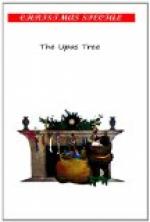Suddenly he seemed to hear Helen’s voice saying earnestly: “My cousin Aubrey is not a good man, Ronnie; he is not a man you should trust.”
This vivid remembrance of Helen, brought him to his senses.
“I prefer not to discuss my wife,” he said, with quiet dignity; “nor my relations with her. Let us talk of something else.”
“By all means, my dear fellow,” replied Aubrey. “You must pardon the indiscretion of cousinly interest. Tell me of your new book. Have you settled upon a title?”
But the instinct of authorship now shielded Ronnie.
“I never talk of my books, excepting to Helen, until they are finished,” he said.
“Quite right,” agreed Aubrey, cordially. “But you might tell me why this one took you to Central Africa. Is it a book of travels?”
“No; it is a love-story. But the scene is laid in wild places—ah, such places! One cannot possibly understand, until one gets there and does it, what it is like to leave civilisation behind, and crawl into long grass thirteen feet high!”
“It sounds weirdly fascinating,” remarked Aubrey. “So unusual a setting, must mean a remarkable plot.”
“It is the strongest thing I have done yet,” said Ronnie, with enthusiasm.
Aubrey smiled, surveying Ronnie’s eager face with slow enjoyment. He was mentally recalling phrases from reviews he had written for various literary columns, on Ronnie’s work. Already he began wording the terse sentences in which he would point out the feebleness and lack of literary merit, in “the strongest thing” Ronnie had done yet. It might be well to know something more about it.
“It will be very unlike your other books,” he suggested.
“Yes,” explained Ronnie, expanding. “You see they were all absolutely English; just of our own set, and our own surroundings. I wanted something new. I couldn’t go on letting my hero make love in an English garden.”
“If you wanted a variety,” suggested Aubrey Treherne, “you might have let him make love in another man’s garden. Stolen fruits are sweet! There is always a fascination about trespassing.”
“No, thank you,” said Ronnie. “That would be Paradise Lost.”
“Or Paradise Regained,” murmured Aubrey.
“I think not. Besides—Helen reads my books.”
“Oh, I see,” sneered Aubrey. “So your wife draws the line?”
“I don’t know what you mean,” replied Ronnie. “Falsehood, frailty, and infidelity, do not appeal to me as subjects for romance. But, if they did, I certainly should not feel free to put a line into one of my books which I should be ashamed to see my own wife reading.”
“Oh, safe and excellent standard!” mocked Aubrey Treherne. “No wonder you go down with the British public.”
“I think, if you don’t mind,” said Ronald, with some heat, “we will cease to discuss my books and my public.”
“Then there is but one subject left to us,” smiled Aubrey—“the Infant of Prague! Let us concentrate our attention upon this entirely congenial topic. I wonder how long this dear child has remained dumb. I have seen many fine instruments in my time, West, but I am inclined to think your ’cello is the finest I have yet come across. Do you mind if I tune it, and try the strings?”




